#or is there a statute of limitations?
Text
i think it would be funny if people occasionally arose from the dead. like if that was a real-life one-in-a-million but well-documented Thing That Sometimes Happens, and the entire legal system around death (laws on inheritance & marriage & murder etc) had to include caveats for the unlikely-but-scientifically-possible event that the dead person in question might spontaneously self-resurrect, even years or decades after death. it would raise so many inconvenient and absurd possibilities
#imagine the legal system in that timeline#property laws and inheritance laws and bigamy laws--what happens if your spouse resurrects 10 years after they die?#think how AWKWARD that would be#what happens if you inherit from someone who comes back do you have to give the inheritance back? what if u used it to buy stuff?#does the jetski u bought with the money your grandpa left u 15 years ago in college now belong to grandpa?#or is there a statute of limitations?#if the guy you got convicted of murdering returns from the dead does your conviction get changed from murder to grievous harm?#how is the grievousness of the harm measured? in the number of years the guy spent as a corpse?#what if you spend 20 years in prison and the victim comes back to life and it turns out grievous harm would have landed you only 5ish years#do you get reimbursed for the extra 15 years u spent in prison?#what is the legal process for proving you have come back to life?#what are the minimum legal requirements for establishing a revenant's identity?#does it become regulation to make fingerprint/dental records of every single person who dies just on the off chance one of them comes back?#what happens if it's someone from like 300 years ago?#the world has changed and everyone they know is dead. is there a social services department that can help with that?#there would be a whole branch of counseling services for people who have reanimated or had a loved one reanimate#grief 2.0 counselors
12K notes
·
View notes
Text
Tim was stumped. It wasn't rare for him to get stuck on a case, no. That came with the territory of being a detective.
Someone had swapped out countless jewels and treasures from museums across the city with fakes without tripping a single alarm. Heck, the only reason anyone knew about this was because of the fact one of the workers broke a priceless antique and it was being appraised for insurance purposes. Then everything unraveled from there.
The case was cracked wide open when the guy Superboy the 2nd was introducing to him said, "Oh yeah. That was me." In the most casual tone.
Tim, baffled, asked "Why would you admit that?"
Danny/Phantom smirked, "Three words. Statutes of Limitations." Turns out he had committed all of these crimes across multiple states right under the heroes noses. Worst still, he did all of this when he was fifteen. The Statutes of Limitations had expired and he couldn't be charged with anything, not that there was any evidence to charge him with anyway.
(Idk if this is funnier if they're all in thier hero outfits or as civilians)
#dp x dc#fanfiction prompts#prompts#danny phantom#danny fenton#batman#tim drake#red robin#yum#not sure where to go with this prompt other than danny as either Fenton or Phantom just rubbing it in the heroes faces#and refusing to explain HOW#danny is in his 20s#the statutes of limitations is like 7 to 10 years depending on the crime and danny stole stuff worth millions
871 notes
·
View notes
Text
I like to think that modern Merlin confesses to crimes and shit he did in medieval times completely unprompted and without context just for shits and giggles.
No one knows if he’s joking or not because he’s always completely deadpan when he says it
#dude is the reason we don’t have a statute of limitations in the uk#bbc merlin#modern merlin#headcanon#merlin
378 notes
·
View notes
Text
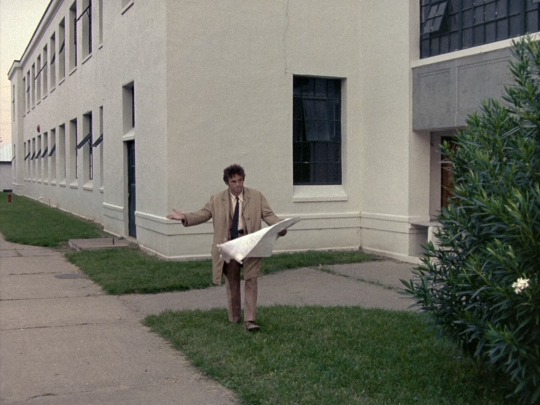
#columbo#season 4#by dawns early light#columbo has Zero spatial/geolocational awareness. he needs a map to get to his own bathroom#unfortunately none of the murderers ever tried just spinning him around in circles a bunch then walking away#not that itd make him forget it was you but hed get lost often enough that the statute of limitations would expire by the time he found you
79 notes
·
View notes
Text
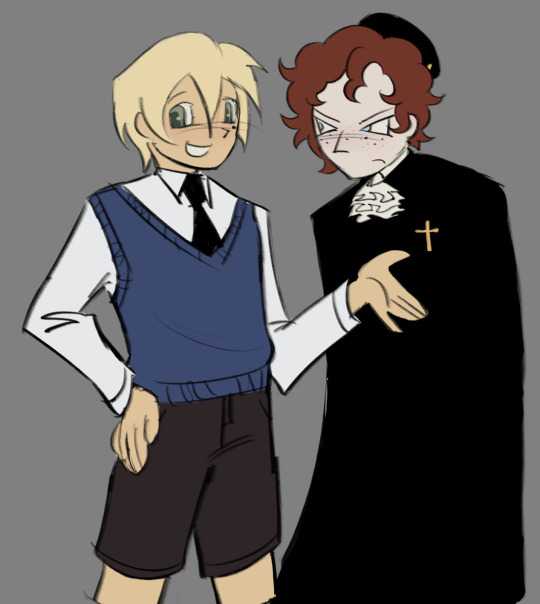

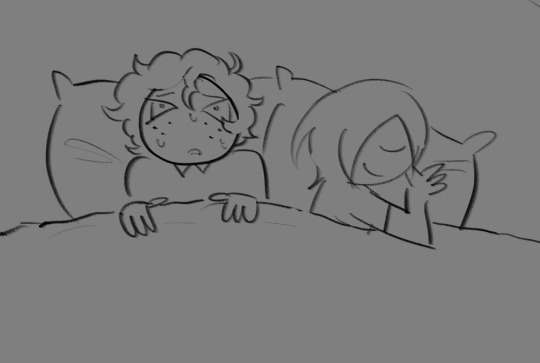
those weird kids and a bonus comic
#lord of the flies#jack merridew#lotf ralph#ralph lotf#jalph#but for real this time#not just if you squint#its all out there#anyway#my art#also england doesn’t have a statute of limitations#which sucks it ruined my joke#@ england get better laws
86 notes
·
View notes
Text
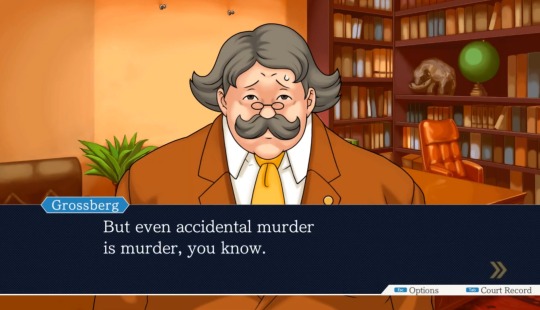

from dialogues like this in the turnabout goodbyes case you can infer that the japanifornian legal system has not only done away with the crime of manslaughter as a less culpable form of homicide entirely and just classes all unlawful killings as murders, but that it also equally punishes accidents even entirely regardless of negligence, appears to have no minimum age of criminal responsibility and does not recognise self defense or defense of a third party. so hypothetically they would try a baby for murder. but i also just find it funny to read that at face value cause.. no the fuck it's not. being not-accidental is kinda the defining characteristic of a murder mr lawyer
#except then again the statute of limitations runs out after 15 years on murder. quite a lot shorter than in most places nowadays#where it is never
112 notes
·
View notes
Text

#disco elysium#de#statute of limitations on discord post theft has now expired. post has been anonymised per regulation including my own contribution
905 notes
·
View notes
Text
honestly i dont think people appreciate bruces little klepto tendencies as much as i do.....
#evidence?? that's his.#something hes interested in??? maybe he'll give it back when hes done with it.#curious about something?? hes taking that shit to study it.#something shiny?? he does love his little tchotchkes....#hes just like me fr....#in my state theres no statute of limitations so shhhh but i have told evyn about some things i may or may not be in pennyless possession of#one of which is something that may or may not been worth a few hundred dollars.#anyways all this to say i think its endearing he has sticky fingers and sometimes gets called out on it#ransom note
82 notes
·
View notes
Text
Wall Street Journal goes to bat for the vultures who want to steal your house
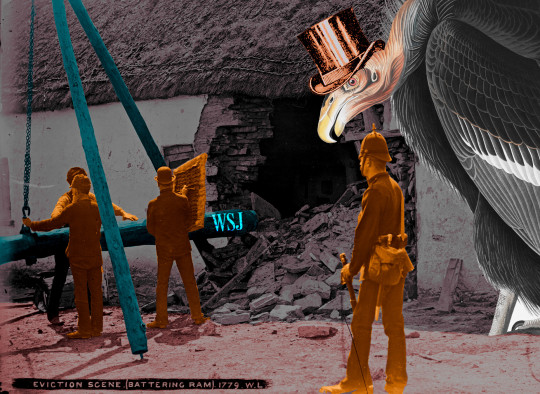
Tonight (June 5) at 7:15PM, I’m in London at the British Library with my novel Red Team Blues, hosted by Baroness Martha Lane Fox.
Tomorrow (June 6), I’m on a Rightscon panel about interoperability.

The tacit social contract between the Wall Street Journal and its readers is this: the editorial page is for ideology, and the news section is for reality. Money talks and bullshit walks — and reality’s well-known anticapitalist bias means that hewing too closely to ideology will make you broke, and thus unable to push your ideology.
That’s why the editorial page will rail against “printing money” while the news section will confine itself to asking which kinds of federal spending competes with the private sector (creating a bidding war that drives up prices) and which kinds are not. If you want frothing takes about how covid relief checks will create “debt for our grandchildren,” seek it on the editorial page. For sober recognition that giving small amounts of money to working people will simply go to reducing consumer and student debt, look to the news.
But WSJ reporters haven’t had their corpus colossi severed: the brain-lobe that understands economic reality crosstalks with the lobe that worship the idea of a class hierarchy with capital on top and workers tugging their forelacks. When that happens, the coverage gets weird.
Take this weekend’s massive feature on “zombie mortgages,” long-written-off second mortgages that have been bought by pennies for vultures who are now trying to call them in:
https://www.wsj.com/articles/zombie-mortgages-could-force-some-homeowners-into-foreclosure-e615ab2a
These second mortgages — often in the form of home equity lines of credit (HELOCs) — date back to the subprime bubble of the early 2000s. As housing prices spiked to obscene levels and banks figured out how to issue risky mortgages and sell them off to suckers, everyday people were encouraged — and often tricked — into borrowing heavily against their houses, on complicated terms that could see their payments skyrocket down the road.
Once the bubble popped in 2008, the value of these houses crashed, and the mortgages fell “underwater” — meaning that market value of the homes was less than the amount outstanding on the mortgage. This triggered the foreclosure crisis, where banks that had received billions in public money forced their borrowers out of their homes. This was official policy: Obama’s Treasury Secretary Timothy Geithner boasted that forcing Americans out of their homes would “foam the runways” for the banks and give them a soft landing;
https://pluralistic.net/2023/03/06/personnel-are-policy/#janice-eberly
With so many homes underwater on their first mortgages, the holders of those second mortgages wrote them off. They had bought high-risk, high reward debt, the kind whose claims come after the other creditors have been paid off. As prices collapsed, it became clear that there wouldn’t be anything left over after those higher-priority loans were paid off.
The lenders (or the bag-holders the lenders sold the loans to) gave up. They stopped sending borrowers notices, stopped trying to collect. That’s the way markets work, after all — win some, lose some.
But then something funny happened: private equity firms, flush with cash from an increasingly wealthy caste of one percenters, went on a buying spree, snapping up every home they could lay hands on, becoming America’s foremost slumlords, presiding over an inventory of badly maintained homes whose tenants are drowned in junk fees before being evicted:
https://pluralistic.net/2022/02/08/wall-street-landlords/#the-new-slumlords
This drove a new real estate bubble, as PE companies engaged in bidding wars, confident that they could recoup high one-time payments by charging working people half their incomes in rent on homes they rented by the room. The “recovery” of real estate property brought those second mortgages back from the dead, creating the “zombie mortgages” the WSJ writes about.
These zombie mortgages were then sold at pennies on the dollar to vulture capitalists — finance firms who make a bet that they can convince the debtors to cough up on these old debts. This “distressed debt investing” is a scam that will be familiar to anyone who spends any time watching “finance influencers” — like forex trading and real estate flipping, it’s a favorite get-rich-quick scheme peddled to desperate people seeking “passive income.”
Like all get-rich-quick schemes, distressed debt investing is too good to be true. These ancient debts are generally past the statute of limitations and have been zeroed out by law. Even “good” debts generally lack any kind of paper-trail, having been traded from one aspiring arm-breaker to another so many times that the receipts are long gone.
Ultimately, distressed debt “investing” is a form of fraud, in which the “investor” has to master a social engineering patter in which they convince the putative debtor to pay debts they don’t actually owe, either by shading the truth or lying outright, generally salted with threats of civil and criminal penalties for a failure to pay.
That certainly goes for zombie mortgages. Writing about the WSJ’s coverage on Naked Capitalism, Yves Smith reminds readers not to “pay these extortionists a dime” without consulting a lawyer or a nonprofit debt counsellor, because any payment “vitiates” (revives) an otherwise dead loan:
https://www.nakedcapitalism.com/2023/06/wall-street-journal-aids-vulture-investors-threatening-second-mortgage-borrowers-with-foreclosure-on-nearly-always-legally-unenforceable-debt.html
But the WSJ’s 35-paragraph story somehow finds little room to advise readers on how to handle these shakedowns. Instead, it lionizes the arm-breakers who are chasing these debts as “investors…[who] make mortgage lending work.” The Journal even repeats — without commentary — the that these so-called investors’ “goal is to positively impact homeowners’ lives by helping them resolve past debt.”
This is where the Journal’s ideology bleeds off the editorial page into the news section. There is no credible theory that says that mortgage markets are improved by safeguarding the rights of vulture capitalists who buy old, forgotten second mortgages off reckless lenders who wrote them off a decade ago.
Doubtless there’s some version of the Hayek Mind-Virus that says that upholding the claims of lenders — even after those claims have been forgotten, revived and sold off — will give “capital allocators” the “confidence” they need to make loans in the future, which will improve the ability of everyday people to afford to buy houses, incentivizing developers to build houses, etc, etc.
But this is an ideological fairy-tale. As Michael Hudson describes in his brilliant histories of jubilee — debt cancellation — through history, societies that unfailingly prioritize the claims of lenders over borrowers eventually collapse:
https://pluralistic.net/2022/07/08/jubilant/#construire-des-passerelles
Foundationally, debts are amassed by producers who need to borrow capital to make the things that we all need. A farmer needs to borrow for seed and equipment and labor in order to sow and reap the harvest. If the harvest comes in, the farmer pays their debts. But not every harvest comes in — blight, storms, war or sickness — will eventually cause a failure and a default.
In those bad years, farmers don’t pay their debts, and then they add to them, borrowing for the next year. Even if that year’s harvest is good, some debt remains. Gradually, over time, farmers catch enough bad beats that they end up hopelessly mired in debt — debt that is passed on to their kids, just as the right to collect the debts are passed on to the lenders’ kids.
Left on its own, this splits society into hereditary creditors who get to dictate the conduct of hereditary debtors. Run things this way long enough and every farmer finds themselves obliged to grow ornamental flowers and dainties for their creditors’ dinner tables, while everyone else goes hungry — and society collapses.
The answer is jubilee: periodically zeroing out creditors’ claims by wiping all debts away. Jubilees were declared when a new king took the throne, or at set intervals, or whenever things got too lopsided. The point of capital allocation is efficiency and thus shared prosperity, not enriching capital allocators. That enrichment is merely an incentive, not the goal.
For generations, American policy has been to make housing asset appreciation the primary means by which families amass and pass on wealth; this is in contrast to, say, labor rights, which produce wealth by rewarding work with more pay and benefits. The American vision is that workers don’t need rights as workers, they need rights as owners — of homes, which will always increase in value.
There’s an obvious flaw in this logic: houses are necessities, as well as assets. You need a place to live in order to raise a family, do a job, found a business, get an education, recover from sickness or live out your retirement. Making houses monotonically more expensive benefits the people who get in early, but everyone else ends up crushed when their human necessity is treated as an asset:
https://gen.medium.com/the-rents-too-damned-high-520f958d5ec5
Worse: without a strong labor sector to provide countervailing force for capital, US politics has become increasingly friendly to rent-seekers of all kinds, who have increased the cost of health-care, education, and long-term care to eye-watering heights, forcing workers to remortgage, or sell off, the homes that were meant to be the source of their family’s long-term prosperity:
https://doctorow.medium.com/the-end-of-the-road-to-serfdom-bfad6f3b35a9
Today, reality’s leftist bias is getting harder and harder to ignore. The idea that people who buy debt at pennies on the dollar should be cheered on as they drain the bank-accounts — or seize the homes — of people who do productive work is pure ideology, the kind of thing you’d expect to see on the WSJ’s editorial page, but which sticks out like a sore thumb in the news pages.
Thankfully, the Consumer Finance Protection Bureau is on the case. Director Rohit Chopra has warned the arm-breakers chasing payments on zombie mortgages that it’s illegal for them to “threaten judicial actions, such as foreclosures, for debts that are past a state’s statute of limitations.”
But there’s still plenty of room for more action. As Smith notes, the 2012 National Mortgage Settlement — a “get out of jail for almost free” card for the big banks — enticed lots of banks to discharge those second mortgages. Per Smith: “if any servicer sold a second mortgage to a vulture lender that it had charged off and used for credit in the National Mortgage Settlement, it defrauded the Feds and applicable state.”
Maybe some hungry state attorney general could go after the banks pulling these fast ones and hit them for millions in fines — and then use the money to build public housing.

Catch me on tour with Red Team Blues in London and Berlin!

If you'd like an essay-formatted version of this post to read or share, here's a link to it on pluralistic.net, my surveillance-free, ad-free, tracker-free blog:
https://pluralistic.net/2023/06/04/vulture-capitalism/#distressed-assets

[Image ID: A Georgian eviction scene in which a bobby oversees three thugs who are using a battering ram to knock down a rural cottage wall. The image has been crudely colorized. A vulture looks on from the right, wearing a top-hat. The battering ram bears the WSJ logo.]
#pluralistic#great financial crisis#vulture capitalism#debts that can’t be paid won’t be paid#zombie debts#jubilee#michael hudson#wall street journal#business press#house thieves#debt#statute of limitations
129 notes
·
View notes
Text
67 notes
·
View notes
Text
the anger and hatred i feel for the "robin wouldn't date nancy cause of steve" rhetoric is literally unmatched by any other force on planet earth
#I will murder each and every one of you with a chainsaw this isn't even about shipping this is about the way you guys talk about shit#I will fucking have your head I will grow a garden of violets and lavender and use your mashed up bones as fertilizer#I will drown you in a pool of your own blood#I will carpet bomb your house I will visit a rage upon you so horrendous it will make the rapture look like a nice family vacation#I want you people to eat shit#<-that. is all copypasted from discord bitching#but anyway. steve has moved the fuck on and if he hasn't he should it's been like 2 years#and while there's obviously a statute of limitations on dating friend's exes st*ncy ending has exceeded that#now we're at the point where it would only matter if it was a shitty ex which nancy is NOT.#“she broke steve's heart🥺” this literally ain't about him idc quit making robin's dating life about steve#also you guys just don't get lesbians if anyone is gonna date a friend's ex it IS a lesbian#you literally don't have to like ronance but I am so tired of people talking about it like this situation would be wrong somehow#they're literally already friends dating isn't even that much of a jump#also you guys have no sense of fun I like messy shit you could make that messy if you wanted#stranger things#ronance#anyway. tis the misogyny hydra again I think
96 notes
·
View notes
Text
Hob Gadling's First Execution
WARNING: GRAPHIC DEPICTIONS OF VIOLENCE
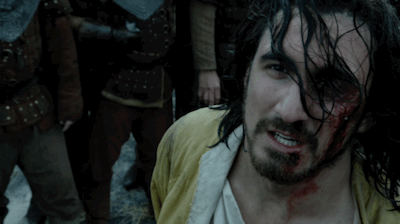
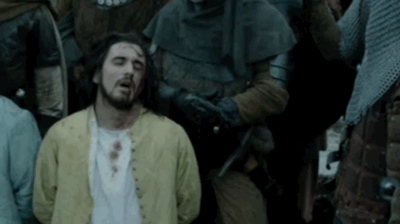
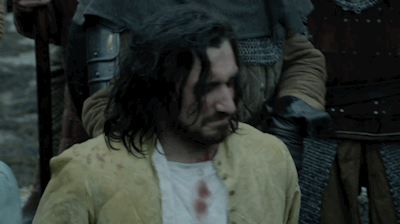

“He was begging,” Dream said. Mud squelched all around them, but he and Death made no sound as they walked over the already bloodied field. “I heard it.”
“He was begging to live, you idiot!” Death said.
“How do you know?” Dream looked at Hob Gadling, kneeling before a hoard of soldiers. His hair and beard were coated in blood.
“He’s writhing away from the man with the axe, not towards him!”
“The specifics were unclear. His lips seem to be leaking, his words were obstructed. And there is only one logical thing to hope for in this scenario.”
Death shook her head. It had barely been a decade since they’d visited the White Horse, and Dream had repeatedly pointed out — as if she could have failed to notice — that the world had only become a less appealing and more brutal place to live.
“But look at him!” Dream said. “Such misery, my sister! Surely he wishes for his torment to be over.”
“This is his torment.” Death said. “And he wishes, I am quite certain, to avoid it entirely.”
She sighed, her eyes running over the line of men on their knees in the mud, hands bound. A few met her eyes with a glimmer of hope. One beamed broadly, even as he shook and panted, blood running down his face. Hob Gadling did not look over. Though he had squirmed when they were first dragged out to the field where the masked man waited to end their short, brutal lives, he was now still. His gaze didn’t scan the assembled crowd for support or mercy but looked defiantly ahead.
“But how could any sensible creature wish to continue to live in a world such as this?” Dream asked.
“I’m pretty sure he doesn’t,” Death said. “None of them do. Not in a world such as this. It doesn’t mean they don’t want to live.”
“Hm.” Dream nodded toward the man who had beamed at Death. “That one likes this world. He still dreams of the glory he may yet achieve through his sacrifice. He would continue on, dying a thousand deaths for his lord if he were allowed.”
“See?” Death smile kindly at the doomed man. “Some sensible creatures have found a way to embrace their reality.”
“I would not call that sensible.”
Death gave Dream a sad smile that said she knew very well his callousness was mostly an act.
Dream knew each and every one of these kneeling men. He had witnessed their final nightmares and bestowed, where he could, more comforting dreams. It was a balance that took a careful hand — something Dream had had to cultivate more and more as civilizations grew. Waking from a lovely dream only to face the executioner could be a torture, while waking from the horrors of night to face the end of torments could be a relief. Forbidden as he was from interfering in the lives of mortals beyond his own dominion, Dream did his best with the powers he had.
And to others — those who would walk away from this field — he gave harsher visions so that they might not forget the blood they shed. He hoped that one day the horror of such practices would impel their end.
Though he was still certain that the next few minutes would prove him right, Dream felt no pleasure. Parts of him would die today. Each of the men kneeling in the mud had lived rich lives within his realm. One who had dreamed of glory now only hoped for a swift end. Another only wished for heat as the chill rain soaked through his tunic and dripped from his hair. Several held friendly faces and warm hands in their daydreams. Others’ minds had gone blank with fear, all thought and creation already stolen from them. Their dreams would die today, and those parts of Dream, too.
Hob Gadling had slept little these last few days. Dream had busied himself with others, honorably not wanting to act in any way that would push his wager with Death one way or another. But now, Hob’s mind was unignorably full and active, daydreams spinning out, vivid and loud. He dreamed of—
Dream turned from the sight immediately.
His own face looked out of the daydreams of Hob Gadling.
“You are ready, my sister?” Dream asked, trying to cover his surprise.
She nodded. “This century’s looking to be nearly as busy as the last.”
As a soldier walked toward Hob, Dream forced himself to watch. He never enjoyed seeing his sister’s work, especially not when it began like this. Humanity had always been prone to fits of violence, but in its growing civilizations, their capacity to enact horror had exploded. Still, Dream had not expected to feel so sick at the sight.
#
Relief and fear gripped Hob in equal measure as the man strode forward to seize him first. He’d’ve preferred to die in battle, sword in hand, but at least this would be over soon.
Let us meet here again, Robert Gadling…
A slight smile brushed his lips. At least the voice he’d heard a thousand times out of memory, held closely in his heart, would accompany him to his end.
…in this tavern of the White Horse, in one hundred years.
“Forgive me, lord,” Hob murmured. “I shall not make our meeting.”
The pretty face shone in his mind as clearly as if he’d last seen it yesterday. His slender, black-clad stranger, the scarlet jewel hung over his chest no match in glamor for those petal pink lips dressed with a mocking smile. Oh, how Hob had wished to meet him again when they were both ancient and put a different expression on that lovely face!
Hob had been lucky. He was not yet old, but he’d made it longer than most. All his mates who’d laughed so heartily at his boasts all those years ago had gone to their graves, wounded or worn down, their laughter long gone. But Hob still felt like his brash, young self, defiant in the face of death. He even looked young. His body had held up remarkably well through years of battle and banditry and plague creeping back through England, and, honestly, he felt that he could have held up many more decades — if not forever.
But now his luck had run out.
Hob looked up defiantly at the enemy who had condemned him. He couldn’t even remember now why they’d been trying to kill each other. The political machinations behind the throne were too distant, and Hob didn’t care. A moment later, he was forced to his belly, pushed down onto hard stone, his face hanging over the river’s edge. He was not important enough for his head to be set on a pike, frightening others away from his treacherous deeds. He was a simple soldier, a common mercenary, just unlucky enough to take a coin for services rendered on the wrong side of the battlefield, — to be swept out of the way with the fall of the axe more for convenience than political statement. Hob’s mortal remains would fall into the river like waste.
He had not even been given the curtesy of a blindfold.
Hob shut his eyes. In the darkness at the end of his life, he looked into a moon-pale face with storm grey eyes. He ignored the final flashes of the life he’d led up until then, regretting only that he would never meet his pretty lord again.
Then agony shattered all thought.
Hob was falling.
Seconds swelled to years.
Warm drops that must have been his own heart’s blood splashed onto his face before the river tumbled him into itself and he was drowning, still feeling the gaping wound at the base of his skull.
Then cold, wet, darkness.
#
Hob woke, thrashing in pain.
He gasped and cried out as the air scraped over raw flesh. He flailed out with both hands and the soft mud was like hot stones against his skin. He flopped like a fish on the river bank, naked, every inch of him scorched with a pain beyond even the most brutal interrogator’s imaginings.
For a long time, Hob just writhed and cried.
#
Death had too much work to linger, but Dream had followed the severed head as it floated down the river. The body of Hob Gadling had been tossed unceremoniously into a pit with a dozen others. Dream knew that the life force that kept the foolish man alive would spring from the brain, though he still severely doubted whether there could possibly be any desire for such a life. Dream had seen uncountable last-second horrors of decapitated victims and knew the pain must be unimaginable, if (usually) brief. Now, he sat hidden in a grove of willows a little ways away from where Hob had washed up and waited for the begging to begin.
Death would not be too busy to return with her mercy.
#
Hob lay curled on the muddy river bank for a long time before he could really look down at the body that had, through some magic, appeared under his neck. It was tender as a fresh cut all over, but it looked like him. Slightly soft with hair over the chest and legs. Bound with the soldier’s muscles he’d had since he was a young man. The only difference Hob could see was that fresh skin had grown where old scars had once been. He hadn’t gotten any scars since his early thirties — not since around the time he’d seen his stranger in the White Horse.
His stranger!
“Oh you beautiful devil!” Hob’s voice was hoarse and it pained him severely to speak. But still, he laughed. “My wonderful, blessed stranger!”
In one hundred years!
He hadn’t just been challenging Hob to live. This wizard or saint or devil must have made it so!
“Oh my stranger, my beautiful lord!” Hob called out. His head tilted back to the heavens. But then he looked around, uncertain if that’s where his mysterious benefactor’s power had come from. He pressed his forehead into the mud, bowing to whatever unseen force had saved him. “If your hand were Satan’s own I’d kiss it!”
As soon as the words left him, he bit his lip — a sharp, torturous pain that made tears spring to his eyes. Hob sat up and looked around swiftly. Even in his glee, a thrill of fear ran through him. He didn’t wish to find out what it was like to be burned alive for consorting with the devil.
“From this day forward,” Hob murmured, his head bowed, “when I pray my Lord, it is to you I pray. Ever after, when I speak of thanks and mercy and forgiveness and glory, it is to you I speak. In your name, lord, though I do not have it. Thank you!”
#
Dream watched, dumbfounded, as Hob Gadling pushed himself up and limped naked down the river bank, grinning like an idiot.
Regretting the time away from his duties, Dream shook his head and turned away. He would be right eventually. This day had only served to vividly remind him him of the acute horror of this world. And Hob still had ninety years left to endure before their next meeting.
Dream was patient.
#I DON'T WANT TO HEAR ONE WORD ABOUT ORPHEUS#This is the AU called Things Work How I Want Them To#Ferdie Friday#Ferdinand Kingsley#Sandman#Dream of the Endless#Death of the Endless#The Hollow Crown#Richard II#Spoiler Alert I guess#I mean this story came out like four hundred years ago so I feel like the Statute of Limitations on Spoilers has expired#I really didn't realize how much the first one looks like he's calling Henry Bolingbroke YOU BITCH and I think it's totally appropriate
161 notes
·
View notes
Note
Jebeudhdbdhdhbdhdhd
Charlie: doll, you dress like I don’t take care of you
Harry with nicer clothes now than literally ever: o-o
I just really want Charlie to call him doll okay
Charlie calling him doll is so perfect and i want you to know I’m shaking this violently like a dog with a chew toy
Harry, confused: I mean at least these are close to fitting. Before I had a stock of Weasley sweaters my clothes were massive on me and no one ever said anything
Charlie: Doll, the more you tell me about your childhood the more concerned I become.
#the elf talks#harry potter#twilight#stepdad harry#Charlie googling the statute of limitations on child neglect in England
26 notes
·
View notes
Text
New York Adult Survivors Act: Lawsuits expected as window for sexual abuse claims opens | CNN
Adult survivors of sexual abuse now can sue their abusers in New York – even if the statute of limitations on their claims has expired – under a state law that goes into effect Thursday.
The new law gives adult survivors of sexual assault one year to file lawsuits against their perpetrators. It also allows people who were sexually assaulted at work or in the care of an institution like a hospital or jail to sue that entity, said attorney Doug Wigdor, who helped push for the law.
“I think there will be some very interesting cases that come about in the employment cases where powerful men, who were supervising women or overseeing women, sexually assaulted them and they will be able to hold their perpetrator accountable but also their employers,” said Wigdor, who represented women who testified against movie mogul Harvey Weinstein, whose convictions in New York for rape and criminal sex act convictions were upheld this year.
153 notes
·
View notes
Text
by far the funniest part of being an adult and having my baby brother also being an adult is what we have (without any prior discussion amongst us) begun to refer to as the statue of limitations on things that we're willing to talk about us doing as stupid kids/teenagers/very young adults in front of our parents now
i cannot tell you the number of times that one of us has been in the middle of telling a perhaps slightly alarming but otherwise amusing anecdote about some shit we did when we were younger and one of our parents (understandably slightly alarmed) will be like "hello i have zero memory of this whatsoever when did this happen?????"
and we're just like lmfao yeah obviously we didnt tell you bc youd never let us leave the house again if you knew it happened but the statute of limitations is up so now i Can actually tell you about that time i got my nose broken in a mosh pit and spent a week hiding it from you
#fair's fair bc sometimes at extended family gatherings one of my parents will whip out a story they never told Their parents#its just that my brother and i have a far funnier explanation of why they didnt hear about these stories when they happened LMAO#statute of limitations wasnt up yet i wasnt about to go down for that!!!!!
9 notes
·
View notes
Text
Reverse DL-6 where the gun Miles threw aimed just a liiiitle differently and ended up shooting Von Karma dead. Because apparently nobody on the DL-6 case was at all competent they can’t figure out what caused his death so it just gets ruled a suicide. Miles is too loopy from oxygen deprivation to remember throwing the gun and due to his dad still being alive he never gets the trauma nightmares that make him remember. Everything is objectively better for everyone until Franziska von Karma, years later, re-opens the case, and because she’s actually competent, figures out it must’ve been one of the three people in the elevator who shot him. Cue Defense Attorney Miles Edgeworth defending his dad from a murder charge that, honestly, really looks quite plausible.
#'but the statute of limitations -' you think franziska cares about the statute of limitations? grow up#i have no real point with this au except that i think the idea is funny. who's miles weird little girl?#my posts#miles edgeworth#franziska von karma#'but there's no way the cops didn't figure out that he must've been killed' i mean yeah but like#a) the ppl who investigated the dl-6 somehow thought the case was difficult enough to bring in a medium despite the only suspects being#a grown adult man who works in security and who had access to a gun. or an actual 9-year-old#so i think it's safe to say they're not great at drawing logical conclusions#and b) don't quote me on this bc i read this ages ago but i'm pretty sure part of the reason the unsolved murder cases in japan is so low#and the suicide rate is so high is bc every time the police can't solve a murder they just rule it a suicide#obviously that's not the ONLY reason for the suicide rate but you know. still fucked up#anyway i think that's something fucked up enough it'd definitely be a thing in the ace attorney universe
357 notes
·
View notes